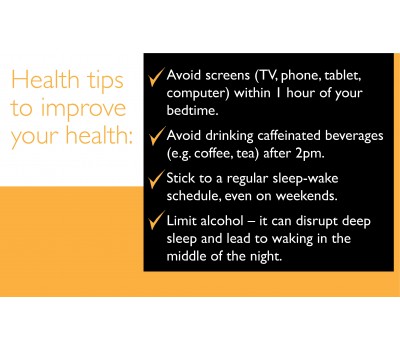Sleep is a Necessity, Not a Luxury

Christmas and New Year parties, end-of-year sales, school holiday promotions and overseas holidays – with so much going on at this time of the year, are you getting enough rest?
Interestingly, survey results showed the percentage of adults sleeping less than 6 hours a day has gone up significantly in the last 30 years. Another survey involving 74,571 adults indicated that 35.3% adults had less than 7 hours of sleep per day. People are staying up later at night, doing work, watching TV, and engaging in internet or social media activities.
Most people associate lack of sleep with only tiredness or sleepiness. However, the detrimental impact of lack of sleep stretches far wider than just fatigue. Research has established strong links between sleep loss and increased accidents, obesity, diabetes, hypertension, decreased memory and cognitive function, depressed mood and increased anxiety. Your body repairs and rejuvenates itself during your sleep. When you sleep less, you are actually speeding up your body’s ageing process and increasing your disease risks.
In today’s fast paced world, getting 6 – 7 hours of sleep sounds pretty good. Sacrificing an hour or two of rest in order to get more done is the norm. But the truth is that even minimal sleep loss takes a toll on your health, physically and mentally. We must correct our misconception about sleep – sleep is a necessity, not a luxury. And catching up on sleep over the weekends isn’t the solution to your accumulated sleep debt.
How much sleep do we really need? Let’s have a look:
|
School-age children (6 - 13 years old) |
9 – 11 hours |
|
Teenagers (14 – 17 years old) |
8 – 10 hours |
|
Adults (18 – 64 years old) |
7 – 9 hours |
|
Older adults (65+ years old) |
7 – 8 hours |
Researchers at the University of California discovered that some people have a gene that enables them to do well on 6 hours of sleep a night. This gene, however, is very rare, appearing in less than 3% of the population. For the other 97% of us, 6 hours doesn’t come close to cutting it.
For your good health, make sleep your priority. Here are some tips for cultivating good sleeping habits:
- Stick to a regular sleep-wake schedule, even on weekends.
- Avoid screens (TV, phone, tablet, computer) within 1 hour of your bedtime.
- Make sure your bedroom is dark, cool, and quiet.
- Avoid drinking caffeinated beverages (e.g. coffee, tea) after 2 p.m.
- Limit alcohol – it can disrupt deep sleep and lead to waking in the middle of the night.


Social Login